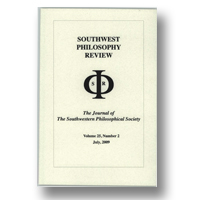|
open submission articles |
|
21.
|
Southwest Philosophy Review:
Volume >
37 >
Issue: 2
Jesús H. Ramírez
Arriving at Racial Identity from Heidegger’s Existentiell
view |
rights & permissions
| cited by
|
|
|
|
|
22.
|
Southwest Philosophy Review:
Volume >
37 >
Issue: 2
Mehrzad A. Moin
Heidegger on Anxiety in the Face of Death—An Analysis and Extension
abstract |
view |
rights & permissions
| cited by
A significant portion of the secondary literature on Martin Heidegger’s Being and Time has focused on interpreting his formal conceptions of death and anxiety. Unlike these previous works, this essay will serve to fill a gap in the Heideggerian portrayal of death. Although he argues that Dasein is anxious about death at a fundamental level and that it proximally and for the most part covers up such anxiety, Heidegger does not provide ontic evidence in support of his claim, instead opting to uncharacteristically take it as something self-evident. I attempt to supplement Heidegger’s framework by introducing Stephen Cave’s immortality narratives and the emerging field of Terror Management Theory as the aforementioned ontic evidence that rounds out Heidegger’s notion of death, before ultimately transitioning from Heidegger’s work into the larger philosophical discourse on death and demonstrating the potential joy that can manifest when one gains a lucid understanding of the ownness of their death and the narratives to which it gives rise.
|
|
|
|
|
23.
|
Southwest Philosophy Review:
Volume >
37 >
Issue: 2
Andrew Barrette
Fate of Ideas: Some Reflections on the Enduring Significance of Manfred Frings’ Rejected Translation of Edmund Husserl’s Ideas II
abstract |
view |
rights & permissions
| cited by
This paper investigates a moment in the history of the phenomenological movement and offers an argument for its enduring significance. To this end, it brings to light, for the first time in a half-century, Manfred Frings’ rejected and so unpublished translation of Edmund Husserl’s Ideas II. After considering the meaning of the term Leib, which Frings renders ‘lived-body’ and to which the editor suggests ‘organism,’ a brief argument for the living tradition of phenomenology is given. It is claimed that the enduring significance of the document is found in the elucidation of the need to renew the phenomenological tradition through a collaboration across generations. Thus, even in its supposed “failure,” Frings’ translation gives data to future thinkers for insight into both their own life and the life of the ideas of phenomenology itself.
|
|
|
|
|
24.
|
Southwest Philosophy Review:
Volume >
37 >
Issue: 2
Blake McAllister
From One Conservative to Another:
A Critique of Epistemic Conservatism
abstract |
view |
rights & permissions
| cited by
Epistemic conservatism maintains that some beliefs are immediately justified simply because they are believed. The intuitive implausibility of this claim sets the burden of proof against it. Some epistemic conservatives have sought to lessen this burden by limiting its scope, but I show that they cannot remove it entirely. The only hope for epistemic conservativism is to appeal to its theoretical fruit. However, such a defense is undercut by the introduction of phenomenal conservatism, which accomplishes the same work from a more intuitive starting point. Thus, if one opts for conservatism, better to choose the phenomenal kind.
|
|
|
|
|
25.
|
Southwest Philosophy Review:
Volume >
37 >
Issue: 2
Nicholas Sars
Retrospective Attitudes and Non-Identity
abstract |
view |
rights & permissions
| cited by
Many philosophers think the non-identity problem undermines the ability for future generations to have been wronged by past ones. This problem has prompted a number of responses, some of which purport to vindicate the relevant claims of wrongdoing. However, I argue that a closely related issue remains even for those convinced by these responses. It is commonly thought that wrongdoing makes certain retrospective attitudes, such as resentment, fitting toward the wrongdoer. In this paper, I shift a familiar problem of future generations from wrongdoing to the fittingness of retrospective attitudes, and I show that a narrative sense of identity provides one means of addressing the puzzle of how these attitudes can be fi tting in non-identity cases.
|
|
|
|
